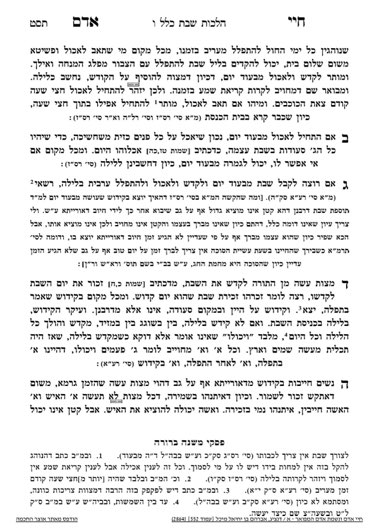The current series, which will cover Maariv on Friday night and Kiddush, is available for sponsorship. Please contact Rabbi Reingold for more information.
We are continuing in siman 5. We learned that women are chayav in kiddush mideoraysa, and that a katan cannot be motzi an adult woman (nor man). We left off discussing the minimum age at which the child could be motzi someone else. Although we assume a boy or girl over the age of bar or bas mitzvah has reached physical maturity, it is obviously not a guarantee. Therefore, we only rely on the bar or bas mitzvah age as being a marker for physical maturity when it comes to dinei derabanan. Over here, where we are discussing a chiyuv deoraysa (assuming the woman has not davened maariv), we cannot rely on chazakah d’Rabba (the assumption that a bar or bas mitzvah child has attained physical maturity). Rather we would need to know with certainty that the boy has reached physical maturity, which we know through their ability to grow facial hair.
The Chayei Adam adds that, according to him, if the woman davens maariv on Friday night, she is yotzei her chiyuv deoraysa of kiddush through shemoneh esrei (see shiur S0155). If so, the chiyuv kiddush on wine becomes a chiyuv derabanan, so a boy who has reached bar mitzvah can be motzi her, even if we do not know with certainty that he has reached physical maturity.
The Mishnah Berurah points out that in order to be motzi another, both parties must have kavanah. A katan should be prompted to remember to be motzi the woman.
Rav Akiva Eiger makes a suggestion. The Rambam holds that the chiyuv kiddush is to say something unique and special about Shabbos. If so, Rav Akiva Eiger suggests that according to the Rambam, a woman is yotzei her chiyuv kiddush mideoraysa after saying something special about Shabbos, and then they could have a bar mitzvah boy be motzi them.
If so, Rav Akiva Eiger suggests that saying “good Shabbos” or the like should be sufficient to be yotzei one’s chyuv kiddush deoraysa. The only day of the week which has a name is Shabbos (“have a good day vs “have a good Shabbos”). Therefore, Rav Akiva suggests that a woman should use this suggestion if she is unable to make kiddush at home, because by saying “good Shabbos” she has fulfilled her chiyuv deoraysa.
In siman 6, the Chayei Adam writes that one can be motzi others in kiddush even though the motzi is not eating there. The Gemara says that in order for one to be motzi another person in a mitzvah, both the motzi and yotzei have to have a chiyuv in the mitzvah, thus they are sharing the maaseh mitzvah. When one makes kiddush for others but does not plan to eat there, the yotzei certainly has a chiyuv, but the motzi would seem not to have a chiyuv. We know that the chiyuv kiddush is b’makom seudah; if the motzi does not plan to eat there, arguably he does not have a chiyuv and his action seemingly can not be construed as a maaseh mitzvah. For example, a chaplain in a Jewish nursing home will often go around the home making kiddush for people. Those people want to be yotzei through him, but he is not eating there. We will discuss this question in the next shiur, be’ezras Hashem.
Summary
- Women are chayav mideoraysa in kiddush, just like men.
- Therefore, in order for a katan to be motzi a woman, we must know he has reached physical maturity, and bar mitzvah age is not sufficient.
- Alternatively, if a woman is yotzei her chiyuv deoraysa in another way, she now has a chiyuv derabanan and can rely on a bar mitzvah boy. According to the Chayei Adam, she can be yotzei her chiyuv deoraysa by davening maariv; according to Rav Akiva Eiger, she can be yotzei through saying “good Shabbos”. Lechatchilla, we do not rely on either of these opinions.



